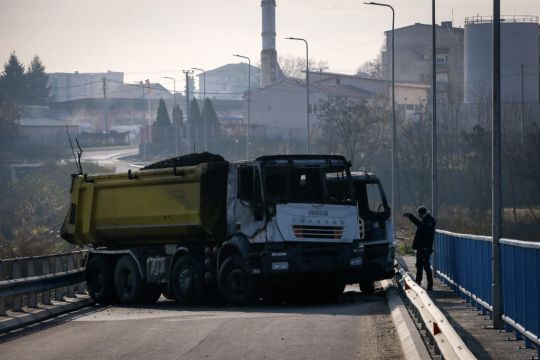Kosovo reopened the country’s main border crossing with Serbia on Thursday, after a nearby barricade that led to its closure was removed.
Serbia’s president said more than a dozen other Serb roadblocks in northern Kosovo would also be dismantled.
Serbian President Aleksandar Vucic said Serbs would start removing their barricades on Thursday.
The move could end weeks of tension between Kosovo and Serbia that triggered fears of new clashes in the Balkans.

Kosovo had demanded that Nato-led peacekeepers remove the barricades, or said its forces would do it.
Serbia then raised the combat readiness of its troops on the border with Kosovo, demanding an end to “attacks” against Kosovo Serbs.
The removal agreement was reached at a late-night crisis meeting with the leaders of Kosovo’s Serbs, Mr Vucic said.
It followed the release from jail of a former Kosovo Serb police officer, whose detention on a terrorism change triggered protests and clashes in northern Kosovo.
A court ordered him to be placed under house arrest on Wednesday.
The roadblocks, which consist mostly of loaded heavy lorries, other vehicles and tents, were still in place mid-morning on Thursday.

Two trucks were set on fire at a roadblock in the northern town of Mitrovica, Kosovo police said.
The former police officer, Dejan Pantic, was detained on December 10 for “terrorism” after allegedly assaulting a Kosovo police officer during an earlier protest.
Kosovo’s president and prime minister have criticised a Kosovo court’s decision to release Pantic from jail.
“How is it possible for someone who is accused of terrorism to go from detention to house arrest,” president Vjosa Osmani said on Wednesday.
The main Merdare border crossing with Serbia closed earlier this week because of a roadblock a few miles away, on the Serbian side of the border.
Kosovo police told expatriates heading to Kosovo from European countries for the Christmas holidays that they could again use that route instead of going through North Macedonia or other entry points.
The unrest over Pantic’s detention sparked tense standoffs and gunshots but no major clashes.
However, international concerns grew of a new conflict in the Balkans while the war in Ukraine is raging.
A separatist rebellion by Kosovo’s majority Albanians led to a 1998-99 war that featured a brutal Serbian crackdown in the territory that was its province at the time.
Nato intervened in 1999 to stop the onslaught and push Serbia out of Kosovo. But Belgrade does not recognise Kosovo’s 2008 declaration of independence and has relied on Russia and China for backing.
Both Serbia and Kosovo have been told they must normalise relations in order to become members of the EU.







